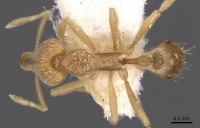Strumigenys zagan
| Strumigenys zagan | |
|---|---|

| |
| Scientific classification | |
| Kingdom: | Animalia |
| Phylum: | Arthropoda |
| Class: | Insecta |
| Order: | Hymenoptera |
| Family: | Formicidae |
| Subfamily: | Myrmicinae |
| Tribe: | Attini |
| Genus: | Strumigenys |
| Species: | S. zagan |
| Binomial name | |
| Strumigenys zagan Bolton, 2000 | |
Known from the type material, two workers from a fogging sample.
Identification
Bolton (2000) - A member of the mjoebergi complex in the Strumigenys godeffroyi-group. S. zagan and Strumigenys phoenix share a shallow cuticular crest on the inner margin of the mandible, as described above. The crest is slightly broader and more conspicuous in the former than in the latter. The two are easily separated as phoenix has the same relatively stout pilosity on both the first and second gastral tergites and has slightly shorter mandibles (MI 38-41), whereas in zagan the second tergite has long flagellate hairs and the mandibles are somewhat longer (MI 45-46). Both these species, together with Strumigenys epyna and Strumigenys phytibia, have the pronotal humeral hair flagellate; see under epyna.
Keys including this Species
Distribution
Distribution based on Regional Taxon Lists
Indo-Australian Region: Borneo (type locality), Brunei Darussalam, Indonesia, Malaysia.
Distribution based on AntMaps
Distribution based on AntWeb specimens
Check data from AntWeb
Countries Occupied
| Number of countries occupied by this species based on AntWiki Regional Taxon Lists. In general, fewer countries occupied indicates a narrower range, while more countries indicates a more widespread species. |

|
Estimated Abundance
| Relative abundance based on number of AntMaps records per species (this species within the purple bar). Fewer records (to the left) indicates a less abundant/encountered species while more records (to the right) indicates more abundant/encountered species. |

|
Biology
Castes
Nomenclature
The following information is derived from Barry Bolton's Online Catalogue of the Ants of the World.
- zagan. Strumigenys zagan Bolton, 2000: 804 (w.) BORNEO.
Unless otherwise noted the text for the remainder of this section is reported from the publication that includes the original description.
Description
Worker
Holotype. TL 2.3, HL 0.61, HW 0.42, CI 69, ML 0.28, MI 46, SL 0.38, SI 90, PW 0.26, AL 0.62. Characters of mjoebergi-complex. Inner margin of mandible in full-face view with a shallow cuticular crest along about the median third of its length; the crest is low and inconspicuous but is sufficient to alter the shape of the margin from evenly concave to shallowly convex where it occurs. Apicoscrobal hair simple. With head in full-face view the ventrolateral margin not visible behind the level of the eye; dorsolateral margin sharply defined and darker in colour than remainder of dorsum. Cephalic dorsum with 4 erect short simple hairs close to the occipital margin, head without other standing hairs but with dense ground-pilosity that is curved and somewhat elevated, especially near highest point of vertex. Pronotal humeral hair flagellate. Pronotum and mesonotum dorsally each with a pair of erect fine subflagellate hairs. Side of alitrunk entirely reticulate-punctate. Lateral spongiform lobe of petiole small, in profile confined to posterior margin of node. Disc of postpetiole finely reticulate-shagreenate to reticulate-punctate. Basigastral costulae strongly defined, coarse basally, about equal in length to disc of postpetiole but not extending half the length of the tergite. First gastral tergite with a pair of flagellate hairs near base, other pilosity on sclerite stiff and simple or slightly flattened and splayed apically; second tergite with a pair of flagellate hairs.
Paratype. TL 2.3, HL 0.62, HW 0.42, CI 68, ML 0.28, MI 45, SL 0.38, SI 90, PW 0.26, AL 0.62.
Type Material
Holotype worker, Brunei: Bukit Sulang, nr Lamunin, 20.viii.-10.ix.1982, fogging, sample T3/1, BMNH 1982-388 (N.E. Stork) (The Natural History Museum).
Paratype. 1 worker with same data but T10(11)/1 (BMNH).
References
- Bolton, B. 2000. The ant tribe Dacetini. Memoirs of the American Entomological Institute. 65:1-1028. (page 804, worker described)
References based on Global Ant Biodiversity Informatics
- Bolton, B. 2000. The Ant Tribe Dacetini. Memoirs of the American Entomological Institute 65
- Pfeiffer M.; Mezger, D.; Hosoishi, S.; Bakhtiar, E. Y.; Kohout, R. J. 2011. The Formicidae of Borneo (Insecta: Hymenoptera): a preliminary species list. Asian Myrmecology 4:9-58

